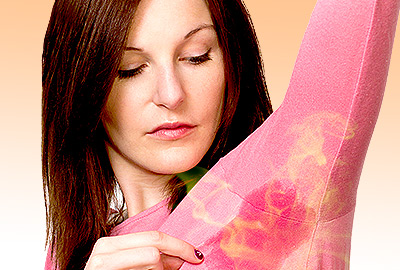When lifestyle changes fail to bring relief from body odor, many women may be inclined to search for a more drastic solution in the form of medication. Continue reading to discover some of the best medicine for body odor so that you can beat this embarrassing and inconvenient symptom once and for all.
About Body Odor
The body is constantly trying to maintain a stable temperature. As such, when the body overheats, the natural reaction is to cool off by sweating.
This sweat is secreted by eccrine glands and apocrine glands on the skin surface. Eccrine glands are found over most of the body, while apocrine glands are found where there is hair, such as the groin and armpits.
When apocrine glands are stressed, they produce a milky fluid, and body odor occurs when bacteria on the skin break down acids in this sweat.
Medications for Body Odor Available
Keep in mind that medicine for body odor will often focus on treating the underlying cause of excessive sweating instead of the body odor itself.
As such, the following body odor medications may be the best options available:
Thyroid medications
A disease that is more common in women than men, hyperactive thyroid - known as hyperthyroidism - causes the body's processes to speed up, leading to symptoms of increased heart rate, nervousness, and excessive sweating, among others.1 In turn, this excessive sweating can lead to body odor. Hyperthyroid medications include propylthiouracil and methimazole.
Diabetes medications
With diabetes, the body may not produce sufficient insulin levels to function properly, thus needing to break down fatty acids for fuel. One of these acids, called acetone, causes the characteristic fruity smell of diabetes. As such, diabetes medications also serve as body odor medicine. Diabetic medications can include metformin, sulfonylureas, meglitinides, or insulin.
Liver disease drugs
When the liver starts to fail, it is inefficient in removing toxins from the body. As such, similarly to diabetes, liver problems could lead to a distinct smell, defined as a bleach-like body odor, as well as breath that smells musty or similar to garlic or rotten eggs.
Hormone replacement therapy (HRT)
The drastic fluctuations of estrogen and progesterone that take place as a woman exits her fertile years with the onset of menopause often deregulate hypothalamic functions, causing excessive sweating and body odor. As such, some women undergo HRT to alleviate said menopause symptoms. Due to serious side effects, the use of HRT should be reserved for severe symptoms.
Antiperspirant medications
Lastly, prescription medications for body odor can include those that prevent sweating, also called antiperspirant medications. However, with this option, the body is prevented from cooling itself off naturally. So, caution should be used.
Alternatives to Body Odor Medications
Menopausal women who are suffering from body odor due to hormonal imbalance may experiment with natural and effective body odor treatments that highlight the use of phytoestrogenic or hormone-regulating supplements.
Phytoestrogenic supplements, like black cohosh or red clover, contain plant-like estrogens that fill in an estrogen deficiency in the body. They are to be used short-term and under the supervision of a certified herbalist.
On the other hand, hormone-regulating supplements, like Macafem, nourish the endocrine glands to produce more of their own hormones, thus helping alleviate menopause symptoms. Because they contain no exogenous hormones, they are safer for long-term use.
Women with other health conditions seeking effective alternatives to their body odor medications should consult with their doctors. He or she will be able to find a viable option based on medical history and preference.
Conclusions
Although socially distressing and embarrassing, body odor does not have to keep you feeling uncomfortable for years to come. By identifying the origin of the body odor and tackling that straight on, women will reap the greatest benefits. Rest assured that help is within reach for a fresher, happier you!
Sources
- AARP. (2017). What's That Smell? Possibly a Health Issue. Retrieved November 26, 2019, from https://www.aarp.org/health/conditions-treatments/info-2017/body-odors-health-risks-fd.html
- Cleveland Clinic. (2018). Sweating and Body Odor | Sweating and Body Odor: Care and Treatment. Retrieved November 26, 2019, from https://my.clevelandclinic.org/health/symptoms/17865-sweating-and-body-odor/care-and-treatment?view=print | https://my.clevelandclinic.org/health/symptoms/17865-sweating-and-body-odor/care-and-treatment
- Institute for Quality and Efficiency in Health Care. (2018). Overactive thyroid: Overview. Retrieved November 26, 2019, from https://www.ncbi.nlm.nih.gov/books/NBK279480/
- Mayo Clinic. (2019). Sweating and body odor: Symptoms & causes | Sweating and body odor: Diagnosis & treatment | Type 2 diabetes: Diagnosis & treatment. Retrieved November 26, 2019, from https://www.mayoclinic.org/diseases-conditions/sweating-and-body-odor/symptoms-causes/syc-20353895 | https://www.mayoclinic.org/diseases-conditions/sweating-and-body-odor/diagnosis-treatment/drc-20353898 | https://www.mayoclinic.org/diseases-conditions/type-2-diabetes/diagnosis-treatment/drc-20351199
- National Institutes of Health. (2018). Smelling Sickness. Retrieved November 26, 2019, from https://newsinhealth.nih.gov/2018/09/smelling-sickness
Footnotes:
- Society for Endocrinology. (2018). Hyperthyroidism. Retrieved November 26, 2019, from https://www.yourhormones.info/endocrine-conditions/hyperthyroidism/




